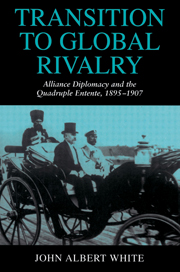Book contents
- Frontmatter
- Contents
- List of illustrations
- List of maps
- Preface
- Chronology
- List of abbreviations
- 1 Portents of conflict
- 2 The focus of hostility
- 3 The emergence of encirclement
- 4 Russia in political recession
- 5 The Algeciras factor
- 6 After Portsmouth and Algeciras
- 7 Imperial truce
- Appendices
- Bibliography
- Index
6 - After Portsmouth and Algeciras
Published online by Cambridge University Press: 04 August 2010
- Frontmatter
- Contents
- List of illustrations
- List of maps
- Preface
- Chronology
- List of abbreviations
- 1 Portents of conflict
- 2 The focus of hostility
- 3 The emergence of encirclement
- 4 Russia in political recession
- 5 The Algeciras factor
- 6 After Portsmouth and Algeciras
- 7 Imperial truce
- Appendices
- Bibliography
- Index
Summary
Russia's new course
The conferences at Portsmouth and Algeciras had twice in seven months provided a forum in which to consider the changing relationships of the major powers. The conferences, however, were quite different in their effect on the balance of power and in their outcome. The Portsmouth conference weighed the consequences of the Russo-Japanese war and awarded Japan a generous share of the claims for which she had gone to war. It was clear that both parties had been weakened by the war, a conclusion which was confirmed in the conference negotiations. Even Russia's rivalry with Germany, however, left her able to maintain her Far Eastern balance with the diplomatic support of France and Britain.
The Algeciras conference, by contrast with that at Portsmouth, met to consider a threat rather than a military victory. It did so in an atmosphere of great international tension and considerable fear of its outcome which could have been a major war or an alteration in the power structure of Europe, a change which would have been unwanted by a large majority of the nations there. The results of the conference were also different from those reached at Portsmouth. While Germany was denied her demands, it was understood that she still wanted to achieve them and this factor remained a latent threat up to 1914. Instead of becoming a fully cooperative member of the community of nations as Japan did, Germany remained a separate and potentially hostile element in the international community.
- Type
- Chapter
- Information
- Transition to Global RivalryAlliance Diplomacy and the Quadruple Entente, 1895–1907, pp. 204 - 239Publisher: Cambridge University PressPrint publication year: 1995



